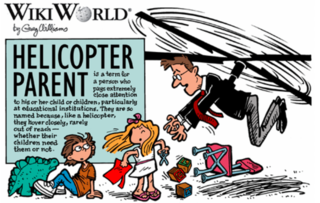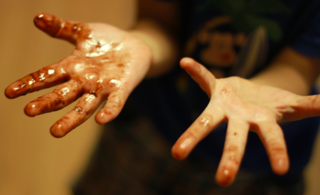Stress
Yes, Overprotective Parenting Harms Kids
If healthy and happy is the goal, there is such a thing as too much safety.
Posted August 28, 2016 Reviewed by Ekua Hagan

Everyone seems to recognize that overprotective parenting is obnoxious. Most agree that it is probably not good for children. And yet, the trend toward so-called "helicopter parenting" grows stronger each year.
As reported on Vox, the "cult of kiddie danger" has so completely consumed some parents and government officials that even swings — yes, SWINGS — are now considered too dangerous for some playgrounds. Despite the patent absurdity of such a belief, most of us respond with a sigh and a roll of our eyes, because we've seen this coming.
If you were to tell a parent in the 1970s or even 1980s that swings were too dangerous for kids, they'd probably look at you like you have two heads. Nowadays, the removal of swings from playgrounds has an air of inevitability to it.

We know it's stupid, but we recognize that it is the next logical step in this mindless march toward... wait, where are we marching again? And why?
On the other hand, what is wrong with being cautious? If children can be hurt, doesn't it make sense to err on the side of safety? Sure, swings are fun, but it's not like taking them down will actually hurt anyone, right? Shouldn't safety concerns trump fun and games? After all, the main job of parents and school is to keep their children safe, right?
Maybe not.
There are two types of stress. Short-term/acute stress, and sustained/chronic stress. Everyone agrees that chronic stress is very bad. In children, chronic stress comes from things like abuse, neglect, sensory deprivation, excessive worry, regular exposure to violence, and so forth. A great deal of research confirms that a chronically stressful childhood often lead to an adult with anxiety, depression, and other mood and adjustment disorders. Or worse. Everyone agrees that children should be protected from chronic stress.

Acute stress, on the other hand, is the response to a frightening, competitive, or dangerous stimulus that is completely resolved within seconds or minutes. It's a short burst of stress, then it's done. Many forms of play, especially physical play, involve some level of acute stress. Sports, video games, and other competitions and contests are strong inducers of acute stress. That's part of why we enjoy them. Evidence is mounting that acute stress is not just fun, but beneficial, even necessary for childhood development.
Scientists have recently found that episodes of acute (brief) stress had positive effects on brain development in rats. Rats regularly subjected to acute minor stress had more neurons, neural stem cells, and connections in their hippocampus, the brain area noted for its role in converting short-term memory to long-term memory. (The hippocampus is usually the first casualty of Alzheimer's disease.)
In another study, rats that were denied the ability to engage in the normal rough and tumble play-fighting as juveniles showed serious social problems as adults. These stress-deprived rats grew up to be hyper-aggressive and even anti-social.

Further, rats that are deprived of playful stress grow into adults that completely freeze when faced with stressful situations. Rats conditioned for stress during childhood, on the other hand, gain the ability to navigate stressful situations without locking up.
Light acute stress even helps rats learn proper fear responses as adults.
These studies do not stand alone. Stress has been studied in a variety of animals and the general conclusion is that acute mild stress is beneficial for brain development, social skills and behaviors, and even intelligence. It has even been shown that acute stress, unlike chronic stress, is good for the immune system!
The bottom line is that research is showing that safe, controlled amounts of acute stress may actually be good for us, especially as children. Safe stress is a way to relieving a "stress valve" that actually lowers levels of chronic stress over the long term. The expression "blowing off steam" is apropos.
Helicopter parents that seek to shield their children from all forms of adversity are not doing them any favors. Physical exertion, confrontations on the playground, competitions with real winners and real losers, getting minor bumps and bruises, and even periodically experiencing fear are all inducers of acute stress.
Falling off of a swing, for example, teaches a kid a variety of lessons that just can't be learned any other way. If kids are protected from all possible risks when the stakes are low, how will they navigate risk-taking when they are older and the stakes are much higher?
While we should all strive to protect children from chronic stress, depriving them of healthy forms of safe stress may leave them unable to deal with stress as adults. (Speaking of which, overprotective parents of young children often grow into controlling parents of adult children, extending the harm.)
What about the obsessive hand-washing and germophobia among today's parents? That might be bad, too.

A growing body of research under the banner of the hygiene hypothesis points to the conclusion that exposing kids to "safe germs" early and often actually strengthens their immune systems in the long term. It also makes them less likely to develop allergies and auto-immune diseases. This makes perfect sense because our immune systems are poorly developed at birth. Our immunity is like everything else we do: to get good at it, we have to practice.
One particularly gross but revealing study showed that the more often children are exposed to animal feces before their second birthday, the lower the chance that they acquire an inflammatory disease as adults.
Remember that the kinds of bacteria, viruses, and other microbes that live in the soil (and even on most animals and plants) are not the ones that make us sick. We catch pathogenic viruses and bacteria from sick people, not from dirt. By being exposed to the wealth of harmless bacteria and viruses found in nature, our immune systems learn to tell the difference between pathogenic and non-pathogenic microbes.
Of course, door handles and subway seats are a different story. Obviously, we should all wash our hands when exchanging germs with other people, especially children and especially during cold and flu season. But when it comes to general outside germs, maybe it's not so bad if our kids roll around in the grass, play in the dirt, kiss their dogs, and bury themselves in the sand.
The politics of child safety are complicated by legal, financial, and sociological factors that often defy logic and common sense. Making matters worse, our species has a strong tendency toward irrational hysteria, fueled by sensationalist media coverage.
However, don't biology and psychology also deserve a place at the table when it comes to making public policy regarding child safety?
Let's stay out of the helicopters and leave the swings where they are. The good that they do for our children's development far outweighs the occasional bruise and scrape.
Truth be told, the bruises might be good for them, too.




